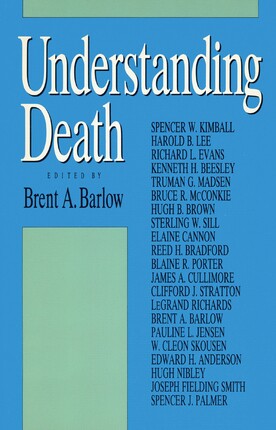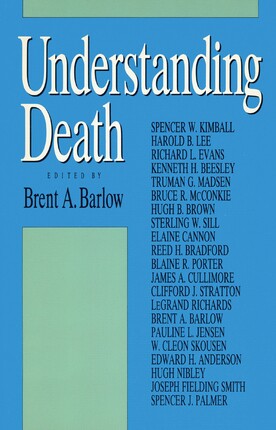Among all the glorious gospel verities given of God to his people there is scarcely a doctrine so sweet, so soul-satisfying, and so soul sanctifying, as the one which proclaims—
Little children shall be saved. They are alive in Christ and shall have eternal life. For them the family unit will continue, and the fulness of exaltation is theirs. No blessing shall be withheld. They shall rise in immortal glory, grow to full maturity, and live forever in the highest heaven of the celestial kingdom—all through the merits and mercy and grace of the Holy Messiah, all because of the atoning sacrifice of Him who died that we might live.
Jesus loves and blesses children. They are the companions of angels. They shall be saved. Of such is the kingdom of heaven.
Now let us record brief answers to the more commonly asked questions about the salvation of children.
► You'll also like: What We Know About the Lives and Spirits of Unborn Children
How and why are they saved?
They are saved through the atonement and because they are free from sin. They come from God in purity; no sin or taint attaches to them in this life; and they return in purity to their Maker. Accountable persons must become pure through repentance and baptism and obedience. Those who are not accountable for sins never fall spiritually and need not be redeemed from a spiritual fall which they never experienced. Hence the expression that little children are alive in Christ. “Little children are redeemed from the foundation of the world through mine Only Begotten,” the Lord says. (D&C 29:46.)
Will they have eternal life?
Eternal life is life in the highest heaven of the celestial world; it is exaltation; it is the name of the kind of life God lives. It consists of a continuation of the family unit in eternity. We have quoted scriptures saying that children will be saved in the celestial kingdom, but now face the further query as to whether this includes the greatest of all the gifts of God—the gift of eternal life. And in the providences of Him who is infinitely wise, the answer is in the affirmative. Salvation means eternal life; the two terms are synonymous; they mean exactly the same thing. Joseph Smith said, “Salvation consists in the glory, authority, majesty, power and dominion which Jehovah possesses and in nothing else.” (Lectures on Faith, pp. 63-67.) We have come to speak of this salvation as exaltation—which it is—but all of the scriptures in all of the standard works call it salvation. I know of only three passages in all our scriptures which use salvation to mean something other and less than exaltation.
Are all little children saved automatically in the celestial kingdom?
To this question the answer is a thunderous yes, with echoes and re-echoes from one end of heaven to the other. Jesus taught it to his disciples. Mormon said it over and over again. Many of the prophets have spoken about it, and it is implicit in the whole plan of salvation. If it were not so the redemption would not be infinite in its application. And so, as we would expect, Joseph Smith’s Vision of the Celestial Kingdom contains this statement: “And I also beheld that all children who die before they arrive at the years of accountability are saved in the celestial kingdom of heaven.” (D&C 138:10.)
It is sometimes asked if this applies to children of all races, and of course the answer is that when the revelation says all children it means all children. There is no restriction as to race, kindred, or tongue. Little children are little children and they are all alive in Christ, and all are saved by him, through and because of the atonement.
Why do some children die and others live?
Are those who die better off than those who remain in mortality?
We may rest assured that all things are controlled and governed by Him whose spirit children we are. He knows the end from the beginning, and he provides for each of us the testings and trials which he knows we need. President Joseph Fielding Smith once told me that we must assume that the Lord knows and arranges beforehand who shall be taken in infancy and who shall remain on earth to undergo whatever tests are needed in their cases. This accords with Joseph Smith’s statement: “The Lord takes many away, even in infancy, that they may escape the envy of man, and the sorrows and evils of this present world; they were too pure, too lovely, to live on earth.” (Teachings, pp. 196-97.) It is implicit in the whole scheme of things that those of us who have arrived at the years of accountability need the tests and trials to which we are subject and that our problem is to overcome the world and attain that spotless and pure state which little children already possess.
Will children be married and live in the family unit?
Certainly. There can be no question about this. If they gain salvation, which is eternal life, which is exaltation, it means that they are married and live in the family unit. President Joseph Fielding Smith has so stated in plain words, and it is something that must necessarily be so. (See Doctrines of Salvation 2:49-57.)
Will children ever be tested?
Absolutely not! Any idea that they will be tested in paradise or during the millennium or after the millennium is pure fantasy. Why would a resurrected being, who has already come forth from the grave with a celestial body and whose salvation is guaranteed, be tested? Would the Lord test someone who cannot fail the test and whose exaltation is guaranteed? For that matter, all those billions of people who will be born during the millennium, when Satan is bound, “shall grow up without sin unto salvation” (D&C 45:58) and therefore will not be tested. “Satan cannot tempt little children in this life, nor in the spirit world, nor after their resurrection. Little children who die before reaching the years of accountability will not be tempted.” (Doctrines of Salvation 2:56-57.) Such is the emphatic language of President Joseph Fielding Smith.
What is the age of accountability?
Accountability does not burst full-bloom upon a child at any given moment in his life. Children become accountable gradually, over a number of years. Becoming accountable is a process, not a goal to be attained when a specified number of years, days, and hours have elapsed. In our revelation the Lord says, “They cannot sin, for power is not given unto Satan to tempt little children, until they begin to become accountable before me.” (D&C 29:47.) There comes a time, however, when accountability is real and actual and sin is attributed in the lives of those who develop normally. It is eight years of age, the age of baptism. (D&C 68:27.)
This principle of accountability has been twisted and perverted and even lost at various times. It was at the root of Mormon’s inquiry to the Lord about infant baptism. (See Moroni 8.) One of our most instructive passages on the point contains the words spoken by the Lord to Abraham. “My people have gone astray from my precepts, and have not kept mine ordinances, which I gave unto their fathers,” the Lord said.
“And they have not observed mine anointing, and the burial, or baptism wherewith I commanded them;
“But have turned from the commandment, and taken unto themselves the washing of children, and the blood of sprinkling.” (JST Genesis 17:4-6.)
Infant baptism was practiced by some even in those early days. The reason? Men no longer understood the atonement. For, as the record continues, those ancient peoples “said that the blood of the righteous Abel was shed for sins; and have not known wherein they are accountable before me.” (JST Genesis 17:7.)
Then the Lord made this promise to Abraham: “I will establish a covenant of circumcision with thee, and it shall be my covenant between me and thee, and thy seed after thee, in their generations; that thou mayest know for ever that children are not accountable before me until they are eight years old.” (JST Genesis 17:11.)
When and with what stature will children be resurrected?
Because they will receive a celestial inheritance, they will come forth in the first resurrection. President Joseph F. Smith said: “Joseph Smith taught the doctrine that the infant child that was laid away in death would come up in the resurrection as a child; and, pointing to the mother of a lifeless child, he said to her: ‛You will have the joy, the pleasure, and satisfaction of nurturing this child, after its resurrection, until it reaches the full stature of its spirit.‛ There is restitution, there is growth, there is development, after the resurrection from death. I love this truth. It speaks volumes of happiness, of joy and gratitude to my soul. Thank the Lord he has revealed these principles to us.” (Gospel Doctrine, pp. 455-56.)
What is our responsibility to our children?
“Lo, children are an heritage of the Lord: and the fruit of the womb is his reward.” (Psalm 127:3.) Our children are our Father’s children. He has entrusted them to us for a time and a season. Our appointment is to bring them up in light and truth so they will qualify to return to his Eternal Presence.
Parents in Zion have an especial responsibility for the care and well-being of the souls entrusted to them. King Benjamin summarized it in these words: “Ye will not suffer your children that they go hungry, or naked; neither will ye suffer that they transgress the laws of God, and fight and quarrel one with another, and serve the devil, who is the master of sin, or who is the evil spirit which hath been spoken of by our fathers, he being an enemy to all righteousness.
“But ye will teach them to walk in the ways of truth and soberness; ye will teach them to love one another, and to serve one another.” (Mosiah 4:14-15. See also D&C 68:25-28.)
Lead image from Getty Images
How do you explain death to children? How do you deal with the death of a loved one? How do you confront your own mortality? Through modern revelations, much information has been given to help deal with the reality of death. Understanding Death features essays by Spencer W. Kimball, Bruce R. McConkie, Hugh B. Brown, Richard L. Evans, Hugh Nibley, Elaine Cannon, Truman G. Madsen, and other leaders and scholars.



